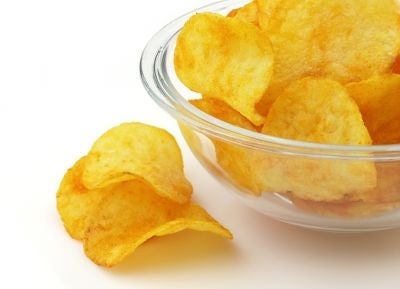Your support helps us to tell the story
From reproductive rights to climate change to Big Tech, The Independent is on the ground when the story is developing. Whether it's investigating the financials of Elon Musk's pro-Trump PAC or producing our latest documentary, 'The A Word', which shines a light on the American women fighting for reproductive rights, we know how important it is to parse out the facts from the messaging.
At such a critical moment in US history, we need reporters on the ground. Your donation allows us to keep sending journalists to speak to both sides of the story.
The Independent is trusted by Americans across the entire political spectrum. And unlike many other quality news outlets, we choose not to lock Americans out of our reporting and analysis with paywalls. We believe quality journalism should be available to everyone, paid for by those who can afford it.
Your support makes all the difference.Dieters who tuck into snacks that use fat-free substitutes like potato chips for a guilt-free indulgence could be sabotaging their efforts and actually gain more weight, researchers say.
In a study that followed lab rats, researchers from Purdue University in Indiana found that animals fed a mix of regular, high-fat chips and fat-free chips gained more weight and developed more fatty tissue compared to the rats that ate only regular, full-fat chips.
The study was published online June 20 on Behavioral Neuroscience , which is put out by the American Psychological Association.
The fat-free chips contained the fat substitute olestra, a synthetic fat with zero calories that passes through the body undigested.
The findings seem counterintuitive: why would eating fat substitutes contribute to more weight gain and fatty tissue than consuming full-fat foods?
Lead researcher Susan E. Swithers, explains that fat substitutes interfere with and confuse the body's ability to regulate food intake.
"Substituting a part of the diet with a similar tasting item that has fewer or zero calories sounds like a common-sense approach to lose weight, but there are other physiological functions at work," Swithers said in a statement.
"Tastes normally alert the body to expect calories, and when those calories aren't present we believe the systems become ineffective and one of the body's mechanisms to control food intake can become ineffective."
In other words, when consuming sweet or fatty foods, tastes send signals to the body to expect a large number of calories, triggering various responses in the body like salivation, hormonal secretion and metabolic reaction. But fat substitutes can interfere with that relationship.
In the study, two groups of lab rats were put on either a high-fat or low-fat diet for 28 days. Researchers then divided those groups in half again, feeding one group a mix of high-fat and fat-free chips, and the other group only full-fat chips.
Researchers found that rats in the high-fat diet group that ate both full-fat and fat-substitute chips consumed more foods, gained more weight and developed more fatty tissue than the rats that ate only high-calorie chips. Nor did they manage to lose weight when the chips were removed from the diet.
Rats on the low-fat diet, meanwhile, experienced little weight gain from either type of potato chips. But when they were switched to a high-fat diet, the rats that were fed both fat-free and high-fat chips gained more weight than rats that only ate high-calorie chips.
Meanwhile, a 2006 study published out of Cornell University also found that low-fat foods can contribute to mindless eating and the consumption of more calories - up to 28 percent more total calories compared to eating full-fat snacks.
The misconception, researchers said, lies in the belief that low-fat snacks are also low-calorie snacks, the study pointed out.
As for losing the extra pounds, Swithers said the common sense method is still the most effective.
"Unfortunately, there is no silver bullet," Swithers said. "Eating food which is naturally low in fat and calories may be a better route than relying on fat substitutes or artificial sweeteners.
Read more: http://www.apa.org/news/press/releases/2011/06/fat-substitutes.aspx

Join our commenting forum
Join thought-provoking conversations, follow other Independent readers and see their replies
Comments